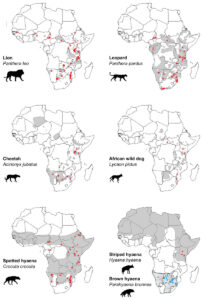Science snippets: Not all carnivores are monitored equally
Erin Adams and Lizanne Roxburgh, the EWT Conservation Planning and Science Unit

The locations of peer-reviewed African large carnivore studies (2000–2020) from Strampelli et al. (2022). Red crosses show where research has taken place, except in the case of Brown Hyaena, where blue crosses are used. Grey areas represent current geographical ranges, except in the case of Brown Hyaena, where a dotted pattern is used.
African large carnivores have undergone significant population declines over the years. Important information needed to conserve them is how many individuals are left in the wild, which can be gained through monitoring, but not all carnivores have been monitored equally. In a recent publication* co-authored by EWT scientists, the monitoring programmes of African carnivores were reviewed to identify important knowledge gaps.
The scientists assessed all scientific publications on the African Lion, leopard, Cheetah, African Wild Dog, Spotted Hyaena, Striped Hyaena, And Brown Hyaena produced since 2000. From there, they could assess which species were extensively monitored and where the research was lacking. The scientists also considered the species’ ranges across Africa and whether all regions carnivores occurred in were monitored equally.
The scientists found that the African Lion was the most researched species, followed by the Striped Hyaena. However, of the study species, the Striped Hyaena has the largest distribution across Africa but has not been studied equally across its distribution (see the figure below). The African Wild Dog had very little research attention across its narrow range. Scientists also found that the larger the distribution of a specific species within a country, the more research was done on that species. Countries such as South Africa and Kenya were among the best studied, while countries in Africa’s Northern, Western and Central regions were generally understudied.
The study further revealed that, outside of South Africa, more than 40% of the studies did not include authors from the study country. Therefore, there is a need to upskill and build capacity within African countries to better protect African carnivores across their range.
*Strampelli, P., Campbell, L. A., Henschel, P., Nicholson, S. K., Macdonald, D. W., & Dickman, A. J. (2022). Trends and biases in African large carnivore population assessments: identifying priorities and opportunities from a systematic review of two decades of research. PeerJ, 10, e14354.
